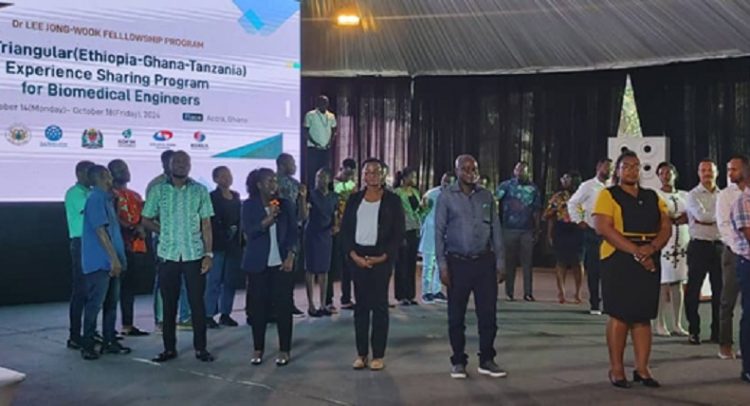Biomedical Engineers at the triangular experience sharing programme
The Korean Foundation for International Healthcare (KOFIH), has organised its maiden edition of the triangular knowledge sharing conference for biomedical engineers in Ghana, Ethiopia and Tanzania.
The event held in Accra, was on the theme, ‘Building a strong Biomedical Engineering Workforce Through Educational and Industry Partnership.’
The event brought together 40 biomedical engineers which consisted of five (5) Ethiopians, five (5) Tanzanians and 30 Ghanaians who shared their knowledge and experiences about KOFIH.
Speaking at the conference for team Ghana, the head of Department for Biomedical Engineering of the University of Ghana, Prof. Samuel KojoKwofie,explained that the course of study in universities should be in alignment with the needs of the industry, thus what is studied in the classroom should be linked to what is needed on the field of work.
“In order to align curriculum with industry needs we need to know the demands of the market; what is required of the market once industry knows the demand of market, then industry can define specific skill set which are needed to attain the target needed at the market.”
He added universities, other stakeholders and the media should provide public understanding of biomedical engineering.
Prof. Kwofie again advised that engineers should be provided with practical training to meet the current needs of time and solve future challenges.
“The learning process must be very engaging, must be hands-on, must be practical and conclusively responsive and evolving to meet the needs of the time, should we have a future pandemic today’s student being trained must be trained to meet the needs of the industry tomorrow and must be responsive and evolving to be able to address those challenges.”
Again, he encouraged biomedical engineers and trainees to gain practical skills through internship programmes from the field and acquire communication skills through the study of humanitarian course like arts and social sciences in order to navigate the world.
Delegates from Tanzania also shared their knowledge and experience on fostering collaborative ecosystem that enhances research through innovation and the application of knowledge in healthcare.
Engineer Chacha, A Tanzanian explained that through joint research initiative, health issues can be addressed early and also improves the economy.
He said “the key strategy to enhance collaboration amongst us is to establish joint research initiatives, develop training and internship programmes to foster communication and networking, align research with industry needs, secure resources and funding.”
He also emphasised that funding is important as nothing can be done in the industry without funding, and encouraged funding from ministry and other key stakeholders.
Mr. Chacha also called for public awareness and advocacy to make the public aware of such programmes.
Leader of the delegate from Ethiopia, Engineer Bisatu explained the responsibilities of Biomedical engineers in healthcare providers, noting that hospitals are to protect medical equipment and ensure safety use of medical tools, as well as practicing proper maintenance of the equipment in order to keep them in shape.
Participants from Ghana, Tanzania and Ethiopia expressed their gratitude to KOFIH and the Lee Jong Wook Fellowship Programme for their training in Biomedical Engineering in Korea.
By Florence Adom Asamoah


